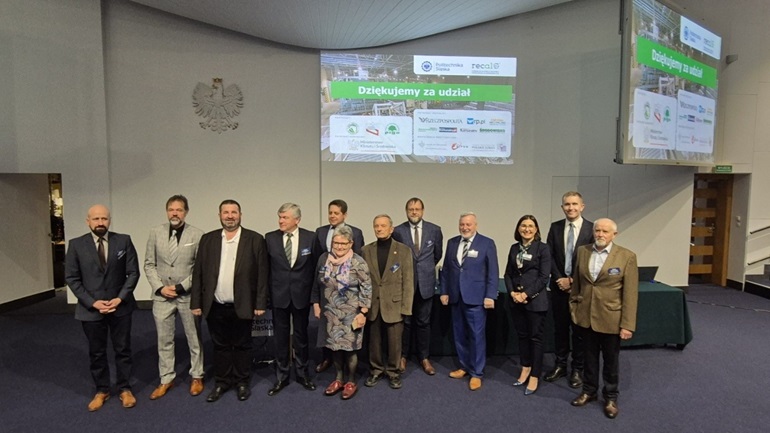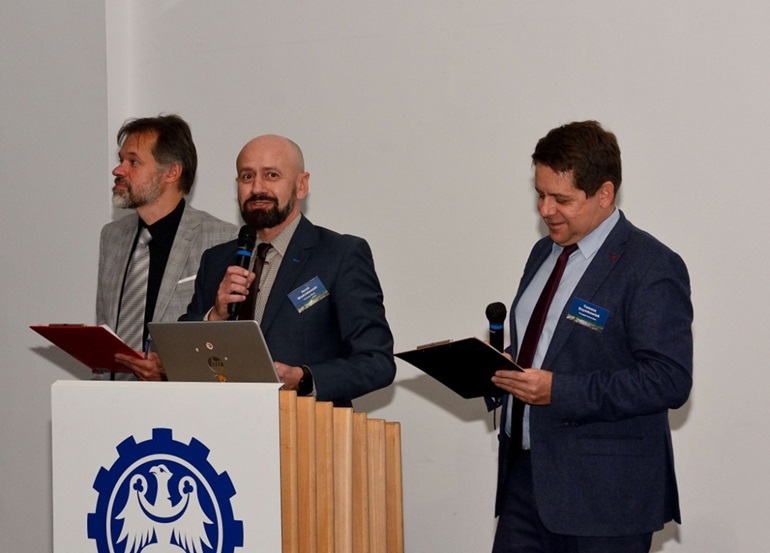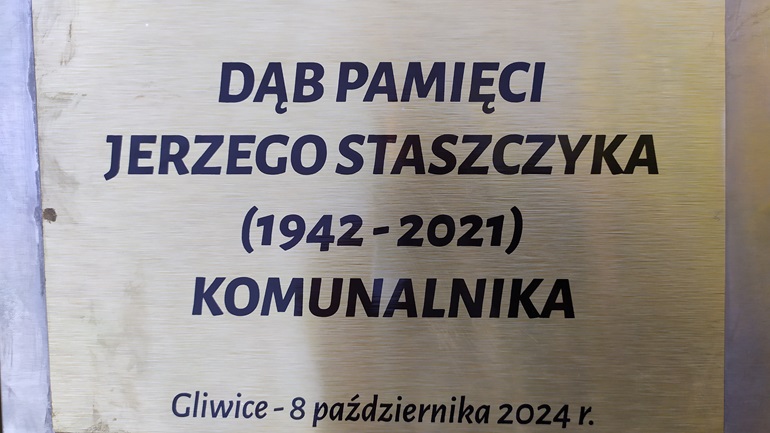Start - Aktualności - Seminar “Experiences of the Polish municipal industry 1989-2024”

Text: Dr Eng. Wojciech Hryb
Seminar “Experiences of the Polish municipal industry 1989-2024”
At the Silesian University of Technology a Jerzy Staszczyk seminar was held, entitled: “Experience of the Polish municipal industry 1989-2024”. During the event, 35 years of activity of the municipal waste management industry were summarized.
Waste management from the perspective of the municipal industry – what have we achieved and where are we going?
The seminar, which took place on October 8, was attended by over 60 experts and nearly 130 participants on-line. The event was an opportunity to discuss the upcoming changes in the Polish waste management model, including the introduction of a deposit system and changes in the formula of extended producer responsibility. Scientists and experts discussed topics related to sorting and recycling of waste, legal regulations of waste management, climate protection, production of fuel from waste and the future of the municipal industry.
The organizers of the event were Silesian University of Technology and RECAL - Foundation for the recovery of aluminium packaging. The patronage was taken by the Ministry of Climate and Environment.
On the part of the Silesian University of Technology, Dr Eng. Wojciech Hryb from the Department of Technologies and Installations for Waste Management at the Faculty of Energy and Environmental Engineering at the Silesian University of Technology in Gliwice was responsible for the organization of the seminar. He also co-led the seminar as well as delivered a lecture on the technology of the waste sorting plant and the importance of morphological composition of waste and sorting efficiency in the modernization of the sorting plant.
The seminar was retrospective in nature, and the result was a unique material that shows a significant scale of positive changes in the municipal sector in Poland.
Over the past 35 years, the municipal waste management industry has recorded a significant “civilizational leap” in waste management, collection, transport, sorting and management, including recycling and recovery. The record of experience and achievements of the Polish municipal industry in the years 1989 - 2024 can be an inspiration and a reference point for countries wishing to aspire to membership in the European Union, e.g. Ukraine.
- We are honoured to co-organize the Jerzy Staszczyk seminar – said Jacek Wodzisławski, President of the Recal Foundation. The Foundation has been operating continuously since 1995 and since then we have been actively supporting the organization of selective collection of packaging aluminium. Today we are a participant in the debate on the final shape of the deposit system from the perspective of beverage cans, as well as the extended producer responsibility system for other aluminium packaging.
The seminar also reminded the patron of the event - Jerzy Staszczyk, a graduate of the Silesian University of Technology, an expert in the municipal industry, who after 1989 sought market reform in Poland, also promoted selective waste collection and modernization of waste treatment. The memory of the expert was also honoured by planting an oak of his name on the Polish Army Coast in Gliwice.

The seminar was graced by excellent speakers - experts from the municipal industry: Dr Eng. Barbara Kozłowska - Lodz University of Technology, Jakub Pawelec - Polish Chamber of Waste Management, Aleksander Kozłowski - National Association of Communal Unions, Agnieszka Fiuk - Chamber of Communal Industry, Dr Hab. Eng. Andrzej Wandrasz - Silesian University of Technology in Gliwice, Prof. Dr Hab Marek Górski - University of Szczecin, Jacek Wodzisławski - RECAL Foundation, Piotr Kardaś - Polish Glass Employers' Association, Michał Korkozowicz - Committee on Environmental Protection of the National Chamber of Commerce, Tomasz Chruszczow - City OK Foundation, Piotr Szewczyk - RIPOK Council. The seminar was led by Tomasz Szymkowiak - Municipal Review.
Competitiveness of the municipal industry
“Achieving the competitiveness of the economy will be the main priority of the European Union assumed for the years 2024 – 2029,” said Jakub Pawelec from the Polish Chamber of Waste Management in his speech. Among the main objectives of competitiveness policy, he mentioned adapting competition to the original Treaty assumptions, removing burdensome regulations, ensuring a level playing field for business, investing in sectors supporting innovation and competition and combating market concentration. He also referred to the latest report by Mario Draghi, which made a broad synthesis of the challenges of the European Union, pointing to the need for urgent modernization in order to increase the competitiveness of the EU.
Jakub Pawelec reminded that competitiveness from 1 January 2025 will be one of the main priorities for the Polish Presidency of the EU in the context of, among others, highlighting the important role of SMEs or noticing the problem of expansion of Chinese companies. In this respect, promoting competitiveness at European level will be of vital importance for many industries, including a very diverse municipal sector, which, through effective cooperation between the public and private sectors, has a positive impact on the prices and quality of services offered, stimulates technological development and creates new jobs, contributing to a strong economy.
“The seminar is largely a retrospective of the changes that have taken place in waste management in recent decades. Our industry has reasons to be proud of. In a relatively short time, there has been incredible progress in technology, logistics and waste management. At the beginning of the 90s, the symbol of that era were municipal plants with outdated, exploited rolling stock and overcrowded landfills. Only by opening the market for municipal services and waste management to competition, privatization and commercialization of municipal enterprises has such progress been possible. These processes also enabled investments of private entrepreneurs, which at every stage ensure efficiency and rationality of expenditures - said Jakub Pawelec, representing the Polish Chamber of Waste Management.

The challenges of the deposit system
During the seminar, the subject of the deposit system, which will start operating in Poland from 1 January 2025, was discussed several times. Although its introduction is already decided, it still raises a lot of emotions. One of the topics constantly recurring in the discussion is the form in which aluminium cans or PET bottles should be returned in order to verify the validity of the deposit payment. For more than 25 years, numerous information campaigns have been conducted to encourage the crushing of aluminium cans to take up less space. Now, however, we face the challenge of completely changing these habits by consumers, as the deposit system requires that packaging be returned in an uncrushed form.
In theory, the deposit system seems simple for the consumer, but in practice it can cause many difficulties. For years we have been instructed on how to properly collect and segregate garbage in five fractions - mixed, metals and plastic, glass, paper and bio. We teach crushing packaging to take up as little space as possible in the container. Extensive educational activities and infrastructure investments have contributed to the implementation of significant changes in waste management. The introduction of the deposit system will result in the huge educational effort made so far and the developed awareness potential of consumers must be reversed, and this requires further investments and time - says Agnieszka Fiuk, Member of the Program Board of the Chamber of Municipal Industry.
It will also be a challenge to collect waste in your home. Bottles or cans collected in an uncrushed form will take up a lot of space. Therefore, an educational campaign is necessary, which will present to consumers the principles of operation of the new system, as well as the challenges and costs associated with it - he adds.
The importance of municipal associations
The role of municipal associations of municipalities was discussed by Aleksander Kozłowski, Deputy President of the National Association of Municipal Communal Unions. The Association aims to educate residents in the proper management of waste – from minimizing its formation to separate collection. While conducting educational activities, the Association cooperates with, among others, local government cultural institutions, educational institutions, social welfare centres and local government officials (sołtys). All these initiatives are primarily intended to change the environmental awareness of local communities, but also to improve the quality of separate collection and have a real impact on the achieved recycling levels.
- The maintenance of cleanliness and order and sanitary facilities, landfills, and waste disposal as well as the matters of water supply and water supply are the tasks of the municipality. The municipality can perform its own tasks in the formula of a commercial law company, an intermunicipal agreement or through the formula of an intermunicipal union. The most difficult part of the Association’s activities is not the implementation of the statutory objectives and the program, but the relations between municipalities – members of the Association. The lack of partnership and self-government selfishness, or the sense of dominance of any of the cooperating municipalities – leads to the destruction of the entire effort. That is why building inter-municipal relationships – although in waste management so obvious – is so difficult! - said Aleksander Kozłowski, Deputy President of the National Association of Municipal Communal Unions.
Dr Eng. Wojciech Hryb from the Department of Technologies and Installations for Waste Management at the Silesian University of Technology in his lecture: “Backroom modernisation - Sorting waste” refers to the history of sorting waste in the world and in Poland. He talked about the role of automation of waste sorting plants
and the use of artificial intelligence in new applications, which will allow to meet the requirements of recyclers as to the quality of sorted raw materials and the implementation of a circular economy. He drew attention to the challenges in the field of waste sorting in Poland, including the lack of installations for sorting and recycling of clothing and textiles to be obligatory collected in Poland from 1 January 2025. He stressed that the basis for the selection of sorting technologies and the direction of modernization of municipal waste sorting plants should be the morphological composition of municipal waste and the efficiency of the sorting process. This type of research is carried out by the Department of Technologies and Installations for Waste Management.
Presentation by Dr Hab. Eng. Andrzej Wandrasz concerned the origin of fuels from waste, their use, and technical possibilities of production. The origin of this problem should be considered the first energy crisis of the 70s of the twentieth century, and it was about searching for such substances, the use of which will save fossil fuels such as coal, gas, or oil. Today, when we talk about the environment, about the use of waste substances in recycling processes, the energy use of non-recyclable waste and the production of fuels created on the basis of waste combustible substances is part of the process of closing the Circular Economy.
Piotr Kardaś from the Polish Glass Employers’ Association talked about the challenges of glass packaging recycling in Poland.
In the edition of Rzeczpospolita dated October 10, 2024, on economic pages you can find a report from the Jerzy Staszczyk Seminar. The extended version will be available on rp.pl: https://klimat.rp.pl/klimat/art41273331-odpady-z-perspektywy-branzy-komunalnej
The announcement was published on the Recal Foundation website : https://recal.pl/informacje-branzowe/gospodarka-odpadami-z-perspektywy-branzy-komunalnej-co-osiagnelismy-i-dokad-zmierzamy/
The video of the seminar can be found at the following link : https://www.youtube.com/watch?v=ZZRVKrjOFgQ









